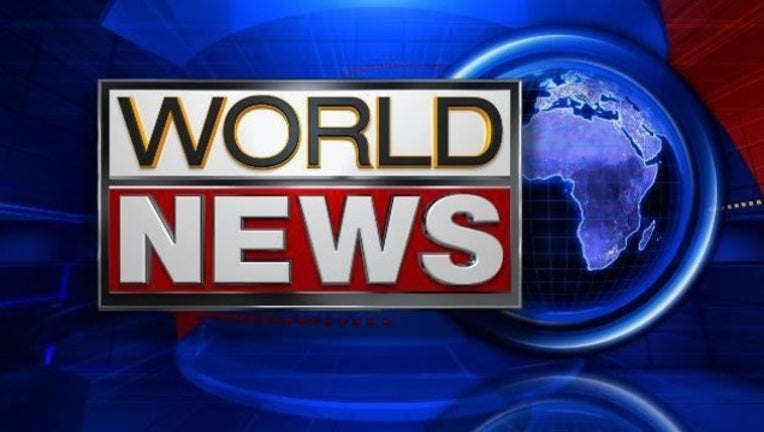Thousands of Iraqis protest against government corruption

BAGHDAD (AP) — Thousands of Iraqis braved the scorching summer heat to stage a huge protest in central Baghdad on Friday, calling on the prime minister to dissolve the parliament and sack corrupt government officials.
Security forces and riot police sealed off Iraq's iconic Tahrir Square and searched anyone who entered the area, but tens of thousands of men, women and children thronged the sprawling square, waving Iraqi flags.
"In the name of religion, the thieves robbed us," they chanted long into the evening.
Men with the government-backed Popular Mobilization Forces, the umbrella group made up predominantly of Shiite militias, pulled up in trucks and handed out ice water bottles to the protesters.
Their gesture was welcomed by roaring shouts in support of the paramilitary force now fighting the Islamic State group. The PMU was hastily assembled last year, with pre-existing militias and new volunteers, to reinforce the Iraqi military after it crumbled in the face of the Sunni militant blitz that seized a third of the country.
"The government is robbing the Mobilization Forces too!" the protesters cried, with many PMU fighters claiming they weren't receiving salaries promised to them.
This is the second Friday of protests in Baghdad and across Iraq, with people initially calling on authorities to address the country's chronic electricity problems as temperatures in the capital soared above 50 degrees Celsius (123 Fahrenheit). But with little action from the Shiite-dominated government following last week's demonstrations, the call for a government shake-up intensified.
As Haider al-Abadi nears his one-year anniversary since assuming the role of Iraq's prime minister, he faces his biggest challenge yet as an economic crisis and crippling war with the Islamic State group put a choke on domestic services. Discontent is rising, even among the country's Shiite majority, with protests springing up in cities from Baghdad to Basra.
"Change, that's what we need," said schoolteacher Najlaa Malek, one of the protesters in the square Friday. "The problems in this country have become too many to list. And our leaders talk a great deal but then they do nothing to fix them."
One man circled the square holding a mock donations box, with the written message: "proceeds go to the house of representatives."
The protesters represented mixed political and religious affiliations, organizers of the protest saying that about 75 percent were liberals, communists, linked to various political groups for youth, or independent. Professional syndicates were on hand, with the members of the lawyers syndicate marching in their judicial robes through the square demanding basic human rights.
Two of Iraq's most powerful Shiite organizations, Badr and Asaib al-Haq, were represented in smaller numbers, while a few religious clerics attended but kept a low profile.
Fadel el-Khafaji, a self-described liberal who has a degree in engineering, sells women's clothing, he said, because he can't find a job in his field.
The problems, he said, include "unemployment, general finances, human rights, where are the proceeds from our oil wealth, where is an end to this war we are living through?" he asked. "The only solution is to dissolve the parliament and a restore presidential authority."
Earlier Friday, Iraq's top Shiite cleric Grand Ayatollah Ali al-Sistani addressed the prime minister in his Friday sermon, calling on al-Abadi to quickly address internal issues in the government.
Through his spokesman Ahmed al-Safi, al-Sistani said the prime minister must be more "daring and courageous" in his steps to reform the government, urging him to strike "with an iron hand fist anyone who is tampering with the people's money."
In a statement following al-Sistani's sermon, the prime minister's office said al-Abadi is "fully committed to the valued guidance of the supreme religious authority."
It added that the premier "pledges to announce a comprehensive plan of reform and work on the implementation" of a reform program.
In a televised speech Friday, Iraq's speaker of parliament Salim al-Jabouri said that the parliament "will interrogate all the ministers in the government who the protesters demand to be questioned."
"We do not hesitate in questioning both those suspected of theft," al-Jabouri added but called on the demonstrators "exercise their constitutional right" without turning to violence.

